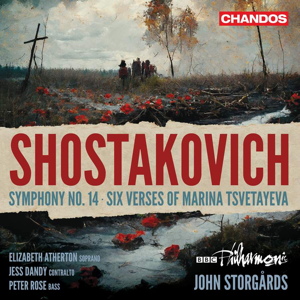
Dmitri Shostakovich (1906-1975)
Symphony No.14 in G minor Op.135
Six Verses of Marina Tsvetayeva Op.143
Elizabeth Atherton (soprano), Peter Rose (bass), Jess Dandy (contralto)
BBC Philharmonic/John Storgårds
rec. 2022, MediaCityUK, Salford, Manchester, UK
Reviewed as a digital download from a press preview
Chandos CHSA5310 SACD [74]
Shostakovich’s late song cycles still remain sadly neglected, most egregiously in the case of the Michelangelo Suite. His cycle on the theme of death had the good fortune to be labelled a symphony, his fourteenth, which has rescued this crowning glory of the composer’s achievement from the fate of the others. Shostakovich himself dithered over naming his settings of the poetry of Michelangelo a symphony too. The history of that magnificent, terrible work might have been very different if he had.
The fate of the setting of six poems by Marina Tsvetayea, here given in its consummate orchestral form, has been even harsher with this superb example of Shostakovich’s austere but superlative late period under the shadow of death barely known. There are signs that these last works of a dying composer are finally getting the attention they deserve- from performers at least. I hope performances as good as this new recording as part of John Storgårds’ burgeoning cycle of the symphonies will draw listeners to it as well.
The opening bars of the first song alerted me to the fact that this is a rather special recording. There is a rare refinement as well as intensity to the string playing which features in both the works on this disc. Storgårds draws from his strings quite an ample generous sound. Something of a risk in music usually played with the most pared back sound possible but a risk that pays off magnificently again and again in both works.
When the celesta steals in in this opening song of the Tsvetayeva cycle, the hairs stood up on the back of my neck so perfect and with such simplicity was Shostakovich’s inspiration realised. It helps that Chandos outdo even their own lofty standards by putting us in the room with the performers.
Aside from the strings, and no disrespect to the two ladies involved – more on them later – the real star of the show for me is bass Peter Rose. He pulls off a minor miracle in combining a suitably Russian blackness to his tone with some genuinely beautiful singing instead of the ill focused gruffness that too often comes with Russian basses. With music this spare, precision matters as very often Shostakovich’s genius is contained in the tiniest of gestures. Try Rose in the opening song of the symphony – the mood is as bleak as a gulag at dawn in winter but it possesses the kind of beauty that stops a listener in their tracks.
Indeed beauty is the hallmark of this recording throughout. Has the mournful lament over the three lilies on the suicide’s grave in the symphony ever sounded more poignant and brittle?
Not that the big moments are undersold. The rush to Lorelei’s death plunge is as thrilling as anyone could want and the Cossacks’ reply in the eighth song, perhaps fuelled by having Putin in mind, is electrifying in its feverish intensity. It is more that Storgårds balances bleakness and frenzy with an affirmation of the eternal beauty of great art – a theme Shostakovich came back to again and again in his later work. I have seldom heard it so powerfully realised in performance. O Delvig, the ninth song of the symphony becomes the emotional climax of the work with Rose again singing superbly undoubtedly inspired by the quite ecstatic string playing.
Similarly, the climax of Tsvetayeva cycle comes in the last song with a quiet but resolutely defiant affirmation of the poet, and by extension, the musician’s art.
It is most remiss of me to have left it so long into this review to mention the wonderful singing of both Atherton and Dandy. The latter gets right under the skin of a very austere, word heavy vocal part. Mirroring the warmth of the BBC Philharmonic strings, her voice is rich and full of feeling rather than bleached out which means the climaxes really blaze out with Dandy’s voice magnificently controlled even when Shostakovich puts it under severe pressure.
The soprano part in the symphony is extremely demanding moving for the Spanish tinged sarcasm of the second song to the bleak stratosphere of the soprano range in the penultimate one. In between the two On Guard songs require comedic flair to bring out the greatness of Shostakovich at his most frugal. Atherton triumphs in the lot and, if Rose weren’t so damned good, it would be her this review would have started with. Or maybe Dandy! A recording with an embarrassment of talent!
This is the best yet in this developing cycle and is required listening for anyone who thinks that Shostakovich’s late works somehow represent a falling off in inspiration. Other accounts of the Fourteenth may sear themselves more forcibly into our consciousness but few that I know provide such a well rounded emotional experience. In the process this recording reveals both works to be rich, varied scores much more than just bleakness.
David McDade
Previous review: Néstor Castiglione (June 2023)
Help us financially by purchasing from




















